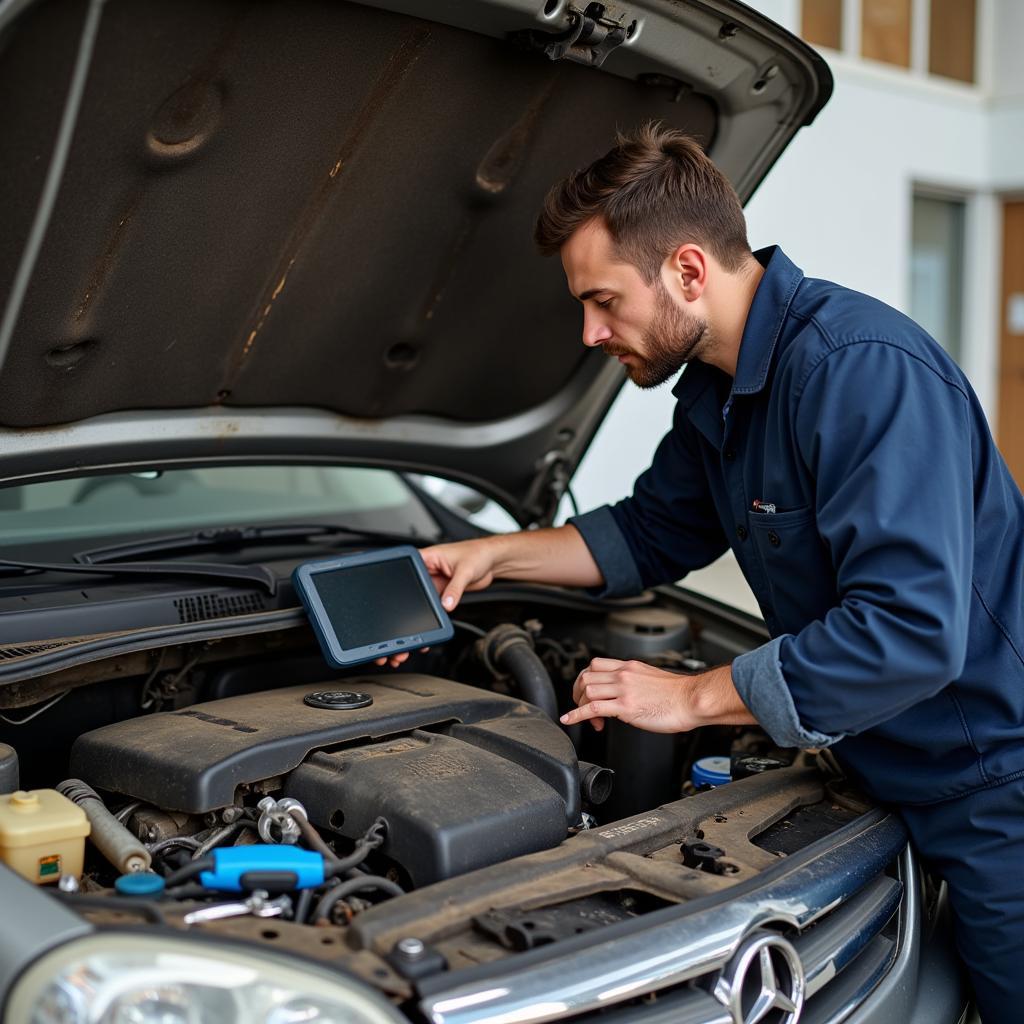Selling a car can be a hassle, especially if it has problems. Whether it’s mechanical issues, body damage, or a salvage title, a problem car can be a tough sell. This article explores proven strategies on how to sell a problem car for cash quickly and efficiently. After reading this, you’ll be equipped to navigate the process and get the best possible return. Let’s dive in.
Understanding Your Car’s Problems
Before you list your problem car, it’s crucial to understand the extent of the issues. A thorough assessment will help you determine a realistic selling price and attract the right buyers. Are the problems primarily cosmetic, or are there major mechanical issues? Knowing the answer will significantly impact your sales strategy.
Identifying Mechanical Issues
Mechanical problems can range from minor annoyances to major engine or transmission failures. A professional mechanic can diagnose the issues and provide a detailed report. This report will be invaluable when negotiating with potential buyers. Having a clear understanding of the mechanical problems allows for transparency and builds trust.
 Assessing Car Problems Before Selling
Assessing Car Problems Before Selling
Evaluating Cosmetic Damage
Cosmetic damage, like dents, scratches, and faded paint, can detract from a car’s value. However, these issues are often less expensive to fix than mechanical problems. Consider obtaining quotes from body shops to understand potential repair costs. This information will be helpful when negotiating a selling price. Some buyers might be willing to overlook cosmetic issues if the price is right.
Where to Sell Your Problem Car for Cash
Knowing where to sell your car can drastically affect how quickly and for how much you can sell it. Let’s explore a few options.
Online Marketplaces
Online marketplaces offer a broad reach and can connect you with potential buyers quickly. Be upfront about the car’s problems in your listing. This transparency will save you time and effort in the long run. A detailed description and clear photos will attract serious buyers who are comfortable with the car’s condition. Remember, honesty is the best policy when selling a problem car.
Have you ever faced car title loan problems? Understanding the intricacies of car titles is crucial for a smooth selling process.
Junkyards and Salvage Yards
Junkyards and salvage yards specialize in buying cars in any condition. They often offer cash on the spot, which can be appealing if you need to sell your car quickly. While you might not get the highest price, you can avoid the hassle of dealing with individual buyers. This can be a great option for cars with significant damage or mechanical issues.
If you’re worried about title issues, learning how to avoid title problems when selling a car can simplify the process significantly.
Dealerships
Some dealerships will buy problem cars, but they may offer a lower price than private buyers. Dealerships often have their own service departments, which allows them to repair and resell the car. This can be a convenient option if you’re looking for a quick and hassle-free sale.
 Different Options for Selling a Car
Different Options for Selling a Car
Negotiating the Best Price
Getting the best possible price for your problem car requires careful negotiation. Here’s how to navigate this process effectively.
Researching Market Value
Research the market value of similar cars in good condition. This will provide a starting point for your negotiations. Factor in the cost of repairs for your car’s problems. This will help you determine a fair and realistic selling price.
When buying a used car, it’s always advisable to check for problems before buying a used car to avoid unexpected issues down the road.
Being Transparent with Buyers
Be honest about the car’s issues. Hiding problems can lead to legal issues and damage your reputation. Providing a detailed inspection report can build trust with potential buyers. Transparency can facilitate a smoother and more efficient sales process. “A well-informed buyer is a happy buyer,” says John Davis, an automotive expert with over 20 years of experience.
Setting a Realistic Price
Don’t overprice your car, especially if it has significant problems. A realistic price will attract more serious buyers. Be prepared to negotiate and be flexible with your asking price. “Setting a fair price from the start shows potential buyers that you’re serious and not trying to take advantage of them,” advises Sarah Lee, a seasoned car sales professional.
Conclusion
Selling a problem car for cash doesn’t have to be a daunting task. By understanding your car’s issues, researching your options, and negotiating effectively, you can get a fair price and move on. Remember to be transparent with potential buyers and set realistic expectations. Need help navigating the process? Connect with us at AutoTipPro for personalized guidance. We’re here to help! You can reach us at +1 (641) 206-8880 or visit our office at 500 N St Mary’s St, San Antonio, TX 78205, United States.
Finding the best way to pay a car off without IRS problems can be a challenge, but it’s crucial for maintaining your financial health. For those dealing with cars without titles, exploring options for junk cars with no title and no problem can provide valuable solutions.
FAQ
-
What if I don’t have the car’s title? Selling a car without a title can be more challenging, but it’s not impossible. Check your state’s regulations on selling a car without a title, as requirements vary.
-
How can I prove the car’s mechanical issues to potential buyers? A detailed inspection report from a certified mechanic is the best way to document the car’s problems.
-
What are the common mistakes to avoid when selling a problem car? Hiding problems, overpricing the car, and not being prepared to negotiate are common mistakes to avoid.
-
Is it better to sell a problem car to a private buyer or a dealership? The best option depends on your individual circumstances and the condition of your car. Private buyers may offer a higher price, but dealerships offer a quicker and easier sale.
-
How can I ensure a safe and secure transaction when selling a problem car for cash? Meeting in a public place, bringing a friend or family member with you, and using a secure payment method can help ensure a safe transaction.
-
Can I sell a car that doesn’t run? Yes, you can sell a non-running car. Junkyards and salvage yards often buy these vehicles for parts.
-
What are the tax implications of selling a problem car? Consult with a tax professional to understand the specific tax implications in your situation.




Leave a Reply